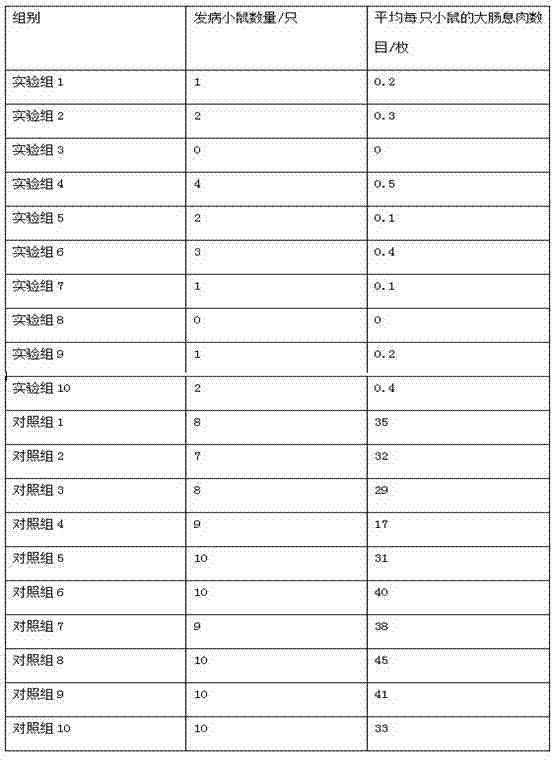Colorectal polyps plant inhibitor and preparation method
A technology for colorectal polyps and biological inhibitors, which is applied in the fields of plant raw materials, plant/algae/fungus/moss components, drug combinations, etc., can solve the problem of high risk of conservative treatment of colorectal polyps, increase the probability of gastrointestinal bleeding, and different progress of development. To achieve the effect of inhibiting colorectal polyps, reducing morbidity and mortality, and improving quality of life
- Summary
- Abstract
- Description
- Claims
- Application Information
AI Technical Summary
Problems solved by technology
Method used
Image
Examples
Embodiment 1
[0042] This embodiment provides a plant inhibitor of colorectal polyps, the raw material formula of which includes by weight:
[0043] 0.4 parts of phenacetin;
[0044] Poplar bark 33 parts;
[0045] 13 parts saw palmetto fruit;
[0046] Blood red white leaf vine 74 parts;
[0047] 24 parts of Pseudoarmillaria;
[0048] Woad 11 parts.
[0049] The above various raw materials can be realized by using commercially available products.
[0050] This embodiment also provides the preparation method of the above-mentioned inhibitor, which includes the following steps:
[0051] a. the poplar bark, saw palmetto fruit, blood red white leaf vine, Armillaria armillaria and Isatis indica are respectively pulverized into small pieces with a particle diameter of 25mm;
[0052] b. mixing the small pieces of each raw material made in step a according to the ratio of the raw material formula to obtain the small piece mixture of raw materials;
[0053] c. Immerse the mixture of small piec...
Embodiment 2
[0061] This embodiment provides a plant inhibitor of colorectal polyps, the raw material formula of which includes by weight:
[0062] 0.1 parts of phenacetin;
[0063] Poplar bark 40 parts;
[0064] 10 parts saw palmetto fruit;
[0065] Blood red white leaf vine 80 parts;
[0066] 20 parts of false armillaria;
[0067] Woad 15 parts.
[0068] The above various raw materials can be realized by using commercially available products.
[0069] This embodiment also provides the preparation method of the above-mentioned inhibitor, which includes the following steps:
[0070] a. the poplar bark, saw palmetto fruit, blood-red white leaf vine, Armillaria armillaria and Isatis indica are respectively pulverized into small pieces with a particle diameter of 10mm;
[0071] b. mixing the small pieces of each raw material made in step a according to the ratio of the raw material formula to obtain the small piece mixture of raw materials;
[0072] c. immerse the mixture of small piec...
Embodiment 3
[0080] This embodiment provides a plant inhibitor of colorectal polyps, the raw material formula of which includes by weight:
[0081] 0.7 parts of phenacetin;
[0082] Poplar bark 20 parts;
[0083] 18 parts saw palmetto fruit;
[0084] Blood red white leaf vine 50 parts;
[0085] 30 parts of false armillaria;
[0086] Woad 5 parts.
[0087] The above various raw materials can be realized by using commercially available products.
[0088] This embodiment also provides the preparation method of the above-mentioned inhibitor, which includes the following steps:
[0089] a. the poplar bark, saw palmetto fruit, blood-red white leaf vine, Armillaria armillaria and Isatis indigo are respectively pulverized into small pieces with a particle diameter of 30mm;
[0090] b. mixing the small pieces of each raw material made in step a according to the ratio of the raw material formula to obtain the small piece mixture of raw materials;
[0091] c. Immerse the mixture of small piece...
PUM
| Property | Measurement | Unit |
|---|---|---|
| Particle size | aaaaa | aaaaa |
| Diameter | aaaaa | aaaaa |
| Diameter | aaaaa | aaaaa |
Abstract
Description
Claims
Application Information
 Login to View More
Login to View More - Generate Ideas
- Intellectual Property
- Life Sciences
- Materials
- Tech Scout
- Unparalleled Data Quality
- Higher Quality Content
- 60% Fewer Hallucinations
Browse by: Latest US Patents, China's latest patents, Technical Efficacy Thesaurus, Application Domain, Technology Topic, Popular Technical Reports.
© 2025 PatSnap. All rights reserved.Legal|Privacy policy|Modern Slavery Act Transparency Statement|Sitemap|About US| Contact US: help@patsnap.com

